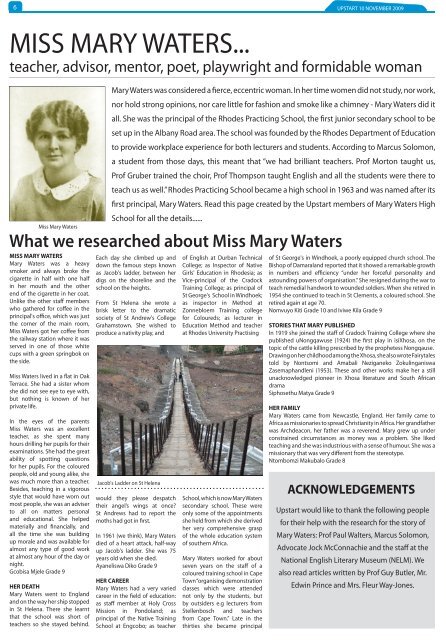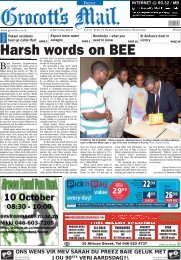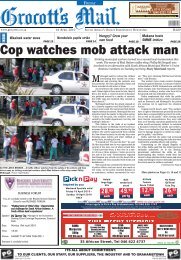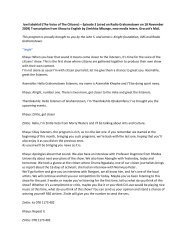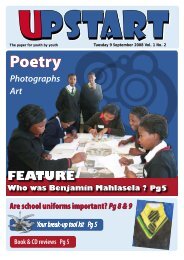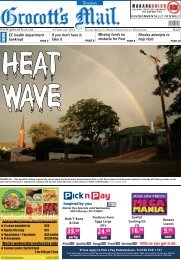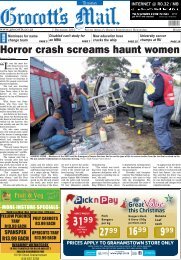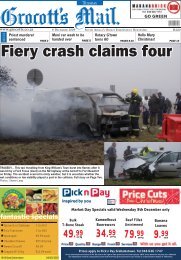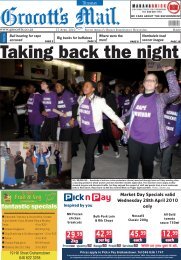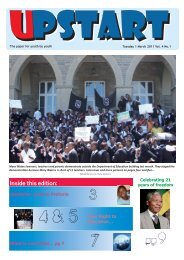Upstart 10 Nov 09.pdf - Grocott's Mail
Upstart 10 Nov 09.pdf - Grocott's Mail
Upstart 10 Nov 09.pdf - Grocott's Mail
- No tags were found...
You also want an ePaper? Increase the reach of your titles
YUMPU automatically turns print PDFs into web optimized ePapers that Google loves.
6 UPSTART <strong>10</strong> NOVEMBER 2009MISS MARY WATERS...teacher, advisor, mentor, poet, playwright and formidable womanMiss Mary WatersMISS MARY WATERSMary Waters was a heavysmoker and always broke thecigarette in half with one halfin her mouth and the otherend of the cigarette in her coat.Unlike the other staff memberswho gathered for coffee in theprincipal's office, which was justthe corner of the main room,Miss Waters got her coffee fromthe railway station where it wasserved in one of those whitecups with a green springbok onthe side.Miss Waters lived in a flat in OakTerrace. She had a sister whomshe did not see eye to eye with,but nothing is known of herprivate life.In the eyes of the parentsMiss Waters was an excellentteacher, as she spent manyhours drilling her pupils for theirexaminations. She had the greatability of spotting questionsfor her pupils. For the colouredpeople, old and young alike, shewas much more than a teacher.Besides, teaching in a vigorousstyle that would have worn outmost people, she was an adviserto all on matters personaland educational. She helpedmaterially and financially, andall the time she was buildingup morale and was available foralmost any type of good workat almost any hour of the day ornight.Gcobisa Mjele Grade 9HER DEATHMary Waters went to Englandand on the way her ship stoppedin St Helena. There she learntthat the school was short ofteachers so she stayed behind.Mary Waters was considered a fierce, eccentric woman. In her time women did not study, nor work,nor hold strong opinions, nor care little for fashion and smoke like a chimney - Mary Waters did itall. She was the principal of the Rhodes Practicing School, the first junior secondary school to beset up in the Albany Road area. The school was founded by the Rhodes Department of Educationto provide workplace experience for both lecturers and students. According to Marcus Solomon,a student from those days, this meant that “we had brilliant teachers. Prof Morton taught us,Prof Gruber trained the choir, Prof Thompson taught English and all the students were there toteach us as well.” Rhodes Practicing School became a high school in 1963 and was named after itsfirst principal, Mary Waters. Read this page created by the <strong>Upstart</strong> members of Mary Waters HighSchool for all the details......What we researched about Miss Mary WatersEach day she climbed up anddown the famous steps knownas Jacob's ladder, between herdigs on the shoreline and theschool on the heights.From St Helena she wrote abrisk letter to the dramaticsociety of St Andrew's CollegeGrahamstown. She wished toproduce a nativity play, andJacob's Ladder on St Helenawould they please despatchtheir angel’s wings at once?St Andrews had to report themoths had got in first.In 1961 (we think), Mary Watersdied of a heart attack, half-wayup Jacob's ladder. She was 75years old when she died.Ayaneliswa Diko Grade 9HER CAREERMary Waters had a very variedcareer in the field of education:as staff member at Holy CrossMission in Pondoland; asprincipal of the Native TrainingSchool at Engcobo; as teacherof English at Durban TechnicalCollege; as Inspector of NativeGirls' Education in Rhodesia; asVice-principal of the CradockTraining College; as principal ofSt George's School in Windhoek;as inspector in Method atZonnebloem Training collegefor Coloureds; as lecturer inEducation Method and teacherat Rhodes University PractisingSchool, which is now Mary Waterssecondary school. These wereonly some of the appointmentsshe held from which she derivedher very comprehensive graspof the whole education systemof southern Africa.Mary Waters worked for aboutseven years on the staff of acoloured training school in CapeTown “organising demonstrationclasses which were attendednot only by the students, butby outsiders e.g lecturers fromStellenbosch and teachersfrom Cape Town.” Late in thethirties she became principalof St George's in Windhoek, a poorly equipped church school. TheBishop of Damaraland reported that it showed a remarkable growthin numbers and efficiency “under her forceful personality andastounding powers of organisation.” She resigned during the war toteach remedial handwork to wounded soldiers. When she retired in1954 she continued to teach in St Clements, a coloured school. Sheretired again at age 70.Nomvuyo Kiti Grade <strong>10</strong> and Iviwe Kila Grade 9STORIES THAT MARY PUBLISHEDIn 1919 she joined the staff of Cradock Training College where shepublished uNongqawuse (1924) the first play in isiXhosa, on thetopic of the cattle killing prescribed by the prophetess Nongqause.Drawing on her childhood among the Xhosa, she also wrote Fairytalestold by Nontsomi and Amabali Neziganeko ZokulinganiswaZasemaphandleni (1953). These and other works make her a stillunacknowledged pioneer in Xhosa literature and South AfricandramaSiphosethu Matya Grade 9HER FAMILYMary Waters came from Newcastle, England. Her family came toAfrica as missionaries to spread Christianity in Africa. Her grandfatherwas Archdeacon, her father was a reverend. Mary grew up underconstrained circumstances as money was a problem. She likedteaching and she was industrious with a sense of humour. She was amissionary that was very different from the stereotype.Ntombomzi Makubalo Grade 8ACKNOWLEDGEMENTS<strong>Upstart</strong> would like to thank the following peoplefor their help with the research for the story ofMary Waters: Prof Paul Walters, Marcus Solomon,Advocate Jock McConnachie and the staff at theNational English Literary Museum (NELM). Wealso read articles written by Prof Guy Butler, Mr.Edwin Prince and Mrs. Fleur Way-Jones.


